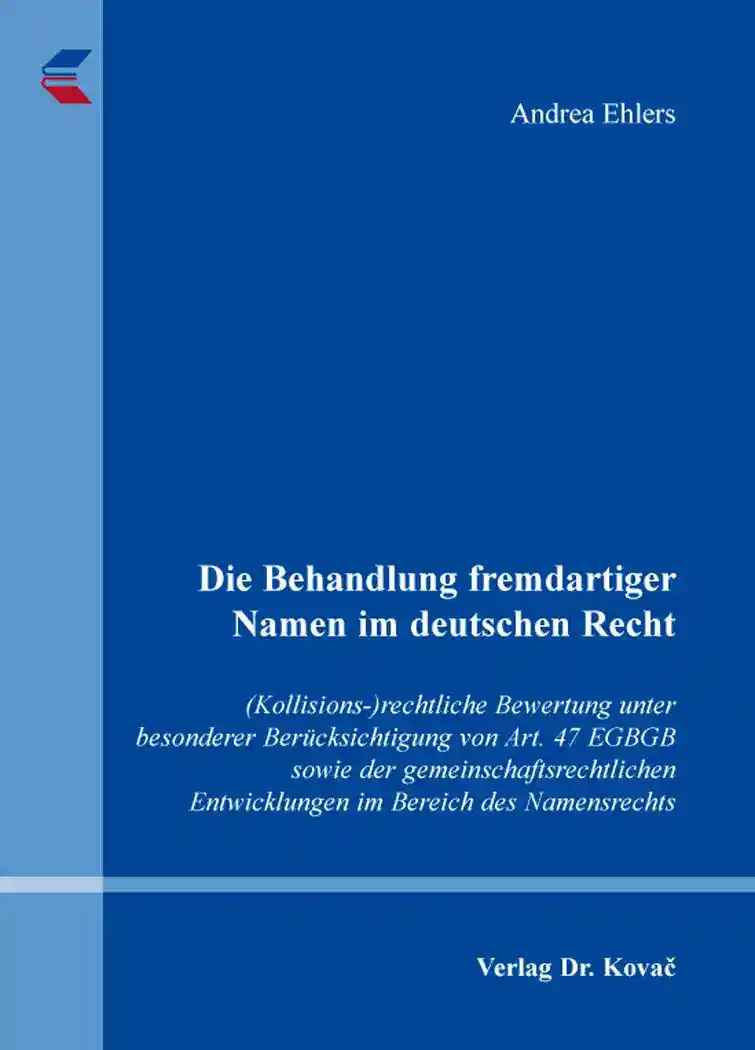Andrea EhlersDie Behandlung fremdartiger Namen im deutschen Recht
(Kollisions-) rechtliche Bewertung unter besonderer Berücksichtigung von Art. 47 EGBGB sowie der gemeinschaftsrechtlichen Entwicklungen im Bereich des Namensrechts
Studien zum Internationalen Privat- und Zivilprozessrecht sowie zum UN-Kaufrecht, volume 69
Hamburg 2016, 352 pages
ISBN 978-3-8300-9110-3 (print) |ISBN 978-3-339-09110-9 (eBook)
Rezensionen
[...] Das Verdienst der Arbeit von Ehlers liegt in der detaillierten Analyse der personenstandsrechtlichen Probleme bei der Eintragung ausländischer Namen in das deutsche Personenstandsregister und der privatautonomen Angleichung nach Art. 47 EGBGB. Sie weist dabei auf bekannte und unbekannte Probleme hin und führt sie jeweils gut begründeten Lösungen zu. Zugleich zeigt die Arbeit auch, wo die Grenzen einer nationalen Regelung des internationalen Namensrechts liegen. [...] Die Lektüre [...] kann daher nur empfohlen werden.
[...] bei aller nachvollziehbarer Sympathie der Autorin für eine Liberalisierung: im Zweifelsfall befürwortet auch die Autorin "strikte" Elemente des Zwangs im Namensrecht [...]. Um dieses hat sie sich mit ihrer gelungenen Dissertation freilich große Verdienste erworben.
About this book deutschenglish
In times of increasing globalization and growing mobility and migration of people, the German law of civil status and names is continuously exposed to questions that arise in connection with unfamiliar types of names.
On daily occurrence, civil registry offices have to deal with cases in which – for instance – foreign nationals marry in Germany, become naturalized or have to be registered regarding their name and/or civil status for other reasons. If their name does not correspond with the name scheme required by German law, is not based on the Latin script or includes diacritical signs that are unknown to the German system, one needs to ask which options of adjustment and harmonization of the unknown name exist for the bearer of the name as well as for the authorities. In this context, tensions in the process of adjusting names may arise not only on the level of national law, but also with view to the Law of the European Union and European Human Rights.
The author’s objective is to work up the possible issues arising when dealing with unfamiliar names in German law, to structurally capture different case groups and to develop solutions that may help the (legal) practitioner to execute (case-related) name adjustments and/or name changes according to the law.
Keywords
AngleichungArt 47 EGBGBEuroparechtFremdartige NamensformenInternationales NamensrechtInternationales PrivatrechtNamensänderungNamensrechtNamenswahlPersonenstandsrechtIhr Werk im Verlag Dr. Kovač

Möchten Sie Ihre wissenschaftliche Arbeit publizieren? Erfahren Sie mehr über unsere günstigen Konditionen und unseren Service für Autorinnen und Autoren.
